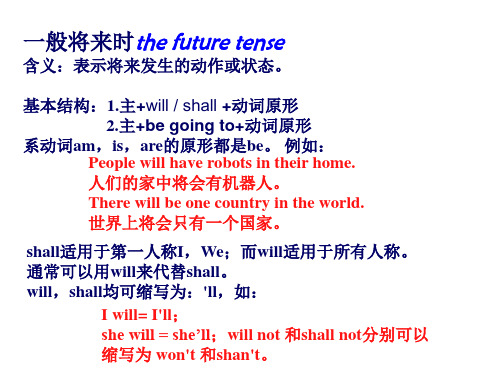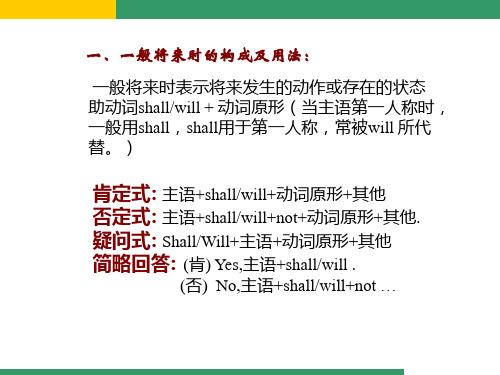
breaking that chair)
• ③ be + 动词不定式 • 这一结构中的be,只有现在式 (am, is, are) 和
过去式 (was, were) 两种形式。
• a. 表示按计划或安排将要发生的动作
• The highway is to be open to traffic in May. • 这条公路将在五月份通车。
• ①用于“பைடு நூலகம் expect, I‘m sure, I think, I wonder + 宾语从 句”中
• Don't worry about the exam. I'm sure you'll pass. • 不要担心这次考试,我确信你会通过的。 • I wonder what will happen. • 我不知道将会发生什么事。 • I don't think the test will be very difficult. • 我想这次测验不会太难。
• Flowers will die without water. • 没有水花会枯死的。 • Water will change into ice at 0℃. • 水在零摄氏度就会结冰。 • This will be your sister, I guess. • 我猜想这是你姐姐。
(三)一般将来时的常用结构
• She will get better.
• 她的病会好的。(认为最终会恢复健康的)
• 2)will表示将来,通常是指事先无计划的意图,是临时决定的;
be going to则表示事先有计划的意图,是经过考虑的。 • — George phoned while you were out. • 你外出的时候乔治打电话来的。 • — Ok. I'll phone him back. • 好的,我给他回电话。(临时决定) • — Matthew phoned while you were out. • 你外出的时候马修打电话来了。 • — Yes, I know. I'm going to phone him back. • 是的,我知道了。我准备给他回电话。(早有安排) • 但在正式文体中,要用will来表示事先安排的动作。 • The meeting will begin at 10:00 a.m.. • 会议将在10点开始。 • Coffee will be served from 9:30 from today onwards. • 从今天起9:30开始供应咖啡。















